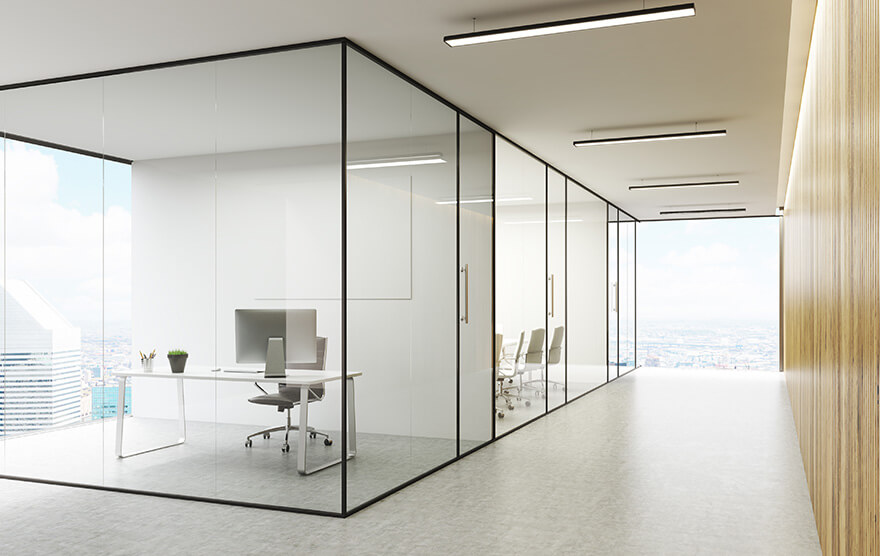There are various types of glass used for windows in residential as well as commercial areas. These glasses have different properties and are installed for different purposes. Among them is soundproof glass which has become highly popular in both homes and offices as it helps to reduce the surrounding noise and gives you complete peace and privacy. There are a lot of people who opt for soundproof glass in their homes or offices, however, there are still a considerable number of people who have doubts regarding the usefulness and importance of soundproof glass. In this article, we will discuss at length soundproof glass and understand how it works. We will also discuss the manufacturing properties and applications of soundproof glass.
Manufacturing Process of Soundproof glass
There are two ways in which soundproof glass is manufactured to make sure that it has all the soundproofing qualities to cancel the outside noise. Some of the manufacturing properties of the soundproof glass are as follows:
1. With the use of a film
- Soundproof glass is made with two layers of glass that are bonded together with an interlayer of Polyvinyl Butyral or PVB.
- The PVB interlayer helps to keep the two layers of glass together and gives it a single-paned appearance.
- The PVB interlayers also help to dampen the noise and weaken the energy of the sound waves when they travel through the glass.
- The soundproof glass provides insulation for the window frame and prevents any noise from passing through
2.Insutaled Glass Units (IGU)
- In an IGU two or more panes of glass are insulated with a spacer in between.
- Depending on the level of insulation required, space the space is adjusted and if need be filled with an inert gas.
The double-glazing soundproof glass has soundproofing and insulating properties, while the laminated soundproof glass has soundproofing and security properties.
AIS is a leading glass manufacturer in India that keeps in mind all these manufacturing properties while making soundproofing glass. This is why it is the top choice as a glass company in India when it comes to buying soundproofing glass. There are various benefits of Installing soundproof glass can provide you with relief from noise pollution in several in ways.
Applications of soundproof glass
There are various applications of soundproof glass involving both residential as well as commercial areas. Some of the common applications of soundproof glass are as follows:
- Patio doors
- Windows
- Skylights
- Internal screens
- Room partitions
- Conservatories
Given the increasing popularity of soundproof glass, there are many glass manufacturers and glass companies in India that manufacture soundproofing glass.
What is the need of Soundproof Glass?
The continuous honking and traffic sound while you are studying or working, or the sound of loud annoying music while you are sleeping can really get on your nerves. But what if you can prevent this from happening by reducing these annoying sounds so that you can focus on your work or enjoy a nice afternoon nap? Now that would be like a dream come true, won’t it? Well, you don’t have to just dream about it if you have soundproof glass installed in your home or office windows.
With its soundproofing qualities, the glass dampens the soundwaves that fall on it and reflects them back to their original source. This means that the sound can’t pass through the glass, thus keeping you safe from the loud noise and sound vibrations that have more negative effects on your health than you can think of.
As far as the need for soundproof glass goes, it is important that you know that loud noise does much more harm than just disturbing you. Research has shown that noise pollution is one of the main causes of stress, fluctuating blood pressure, irritability, loss of memory, and many other psychological and physical problems. This is why soundproofing your windows has become kind of necessary in this day and age.
Why Choose AIS?
Asahi India Glass Limited or AIS is a glass company in India that manufactures and supplies a variety of glass and glass products including, soundproof glass. The company works by considering all the national as well as international quality standards, so you can be assured of the quality of the soundproof glass from them. Whether it is the construction and building industry or the automotive industry, AIS has got all covered. Considering all the positive qualities and reliability of Asahi India Glass Limited or AIS, it becomes a top choice to buy soundproof glass from.
FAQs
As the name suggests, soundproof glass is any glass that doesn’t let sound pass through it. This glass usually has two layers of Polyvinyl Butyral or PVB in between them.
Yes. Soundproof glass or acoustic glass do really work by significantly reducing the sound that passes through it. Installing soundproof windows has been really helpful for noise reduction.
For soundproofing, the glass should at least be of a thickness of 12 mm with different layers of material to reduce the sound significantly. Such a glass gives up to 20 dB of sound reduction.
The most commonly used glass for soundproofing is laminated glass. This glass has a double layer of PVB that dampens the soundwaves and effectively reduces the sound and provides excellent soundproofing.
The most common applications of soundproof glass are in both residential and commercial areas where the glass is installed to muffle the surrounding sounds.

